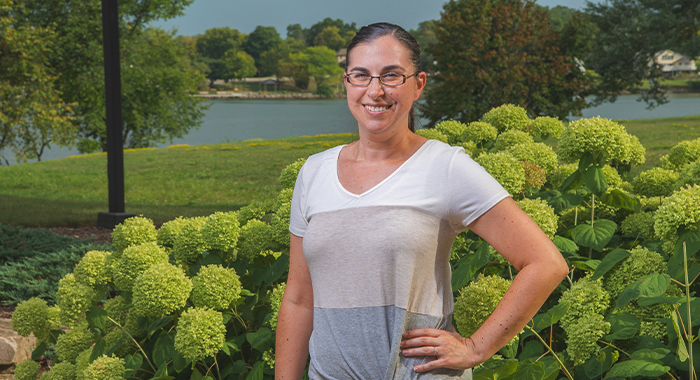SNC prof meets unfilled need for mental health testing in northeast Wisconsin
Michelle Schoenleber (Psychology) is a licensed clinical psychologist who is currently treating patients at Foundations Health & Wholeness in Green Bay. That’s between teaching classes, such as Personality Psychology, at SNC and conducting research. It may seem like overfilling one’s plate, but for Schoenleber, the symbiotic nature of instruction, research and field work is the exciting bit.
“By the end of my first year here teaching, I was not only missing doing at least a little bit of clinical work, because I had spent nine years getting trained in that, but I could already feel my examples in the classroom becoming stale and old, and that was only going to get worse if I stayed out of the field,” says Schoenleber.
She agreed to do testing for Foundations because they had no one else; a doctorate degree is required to do testing. For her testing services, she was able to get a small case load of therapy patients in return.
Testing in the field
There are two broad types of testing: psychological and neuropsychological. Psychological testing is done through a combination of interviews and questionnaires to determine possible mental health disorders, such as depressive disorders, anxiety disorders or eating disorders. Neuropsychological assessments are for diagnosing issues with brain behavior relationships and cognitive function, such as ADHD. Schoenleber also tests for learning disorders, which don’t fit neatly into the two broad types.
The vast majority of counselors, master’s-level providers, are not trained in assessment, meaning that if a certain case is not straightforward or clear, that patient is referred to a clinical therapist for further care.
“In a psychological evaluation, we’re usually starting with the structured clinical interview, which is going to cover the more common mental health concerns: depressive disorders, bipolar disorder, psychosis, anxiety disorder, substance-use disorders, and so on,” says Schoenleber.
“Then there’s a semi-structured interview; that has a series of questions you use as your starting point in order to begin asking about a particular symptom. But it’s considered semi-structured, because you can deviate from that to ask follow-up questions to make sure you’re understanding the person’s responses.”
That part typically results in a more natural conversation, says Schoenleber. When carrying out these assessments, a natural rapport with the patient is vital. They have often experienced stereotypes and marginalization by their peers, so getting them to open up can be challenging.
Outside of interviews and conversation, patients may undergo tests, such as a continuous performance test for ADHD. That assesses the participant’s ability to respond effectively and not impulsively to target stimuli while dealing with a series of distractions.
Treatments do not follow a one-size-fits-all approach
Schoenleber usually works with patients who have anxiety disorders, post-traumatic stress disorder, personality disorders and depression. Her current case load offers an interesting glimpse into the clinical world.
“My long-standing patient that I’ve been working with for nearly five years, her original diagnosis is generalized anxiety disorder. She also has a series of physical illnesses that contribute to ongoing distress, and then she unfortunately had a potentially traumatic event during treatment, and so she also has met criteria for post-traumatic stress disorder. We shifted gears over the winter to specifically address trauma and have now shifted back to values-based living and maintenance of concerns related to generalized anxiety and depression, which she has as well,” Schoenleber says.
“My second patient, we have been working on emotion, regulation, distress, tolerance and grounding skills in preparation for doing PTSD treatment. She has been experiencing post-traumatic stress symptoms for well over a decade. And, as you can imagine, that makes a person very sort of emotionally frayed. We’re going to ask you to face something that was incredibly difficult for you in your life.”
Schoenleber uses only empirically supported treatments. The two she deploys most commonly are dialectical behavior therapy and acceptance and commitment therapy; both started to develop in the 1980s.
These stand in contrast to popular but fleeting treatments sometimes deployed by master’s-level providers that do not have the scientific research to support them. They are attractive because they are easier to obtain certifications in, and parts of the therapies can be effective.
“Unfortunately, the treatments worth getting trained in take more time and cost more money in some cases. And so, there’s just a disconnect between the goal that our master’s-level counselors have, and the outcomes of what they’re able to provide,” says Schoenleber.
Applications in the classroom
Schoenleber’s clinical work has been invaluable in her ability to relay lessons and concepts to her undergrads. It’s not uncommon for her to go into class, such as her Psychological Interventions lab, and be able to share a recent time when she put that day’s lesson into practice.
“Test questions are rarely about a definition of a concept or a definition of a symptom,” says Schoenleber. “Students are more likely to get a patient vignette on a test: something one of my patients has said to me recently and they’re asked to identify what the symptom is or identify how a therapist using a given approach might respond to that. ... I hope that it makes these disorders more real for the students in the class, that these aren’t things that happen rarely. … They live in your community.”
Sept. 7, 2023












